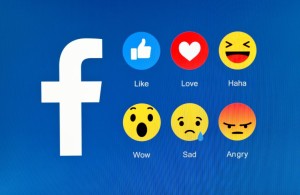Facebook’s New “Reactions” Change the Marketing Landscape
The rise of internet marketing in the electronic age has made making a connection with clients easier and more immediate than ever before. The ability to share content instantly on social media networks, and particularly on Facebook, makes it possible to engage in an ongoing dialogue with hundreds or even thousands of past and potential customers at once, a dialogue that provides extremely useful customer feedback even as it improves overall brand recognition. However, the newest changes in the way that Facebook will operate may potentially undermine this valuable source of information, forcing marketing teams to modify their existing procedures in order to adapt.
 Specifically, we’re talking about Facebook’s “Reactions,” the new, emoji-inspired response buttons that allow users to quickly and easily react to posts with a single click. Now, in addition to the old standard “Like” option, we can “Love”, “Haha”, “Wow”, “Sad”, or “Angry” a post, expressing feelings without the need for explanation or written commentary. While this certainly does give people a faster and easier way to communicate on the go, it may also significantly limit the useful information that can be gained from Facebook and potentially make answering educational questions and responding to negative online reviews much more difficult. In the past, negative comments about a brand’s performance or about a specific customer’s experience could be extremely useful, as they could grant insight into how a business might improve and provide a list of specific issues that needed to be addressed. A simple “Sad” or “Angry” face is nothing more than unconstructive criticism, a vague interjection that provides no context within which to address the situation. Ultimately, it raises the question whether the addition of these new response options will be of any benefit to the business owner, the consumer, or even to the average Facebook user at all.
Specifically, we’re talking about Facebook’s “Reactions,” the new, emoji-inspired response buttons that allow users to quickly and easily react to posts with a single click. Now, in addition to the old standard “Like” option, we can “Love”, “Haha”, “Wow”, “Sad”, or “Angry” a post, expressing feelings without the need for explanation or written commentary. While this certainly does give people a faster and easier way to communicate on the go, it may also significantly limit the useful information that can be gained from Facebook and potentially make answering educational questions and responding to negative online reviews much more difficult. In the past, negative comments about a brand’s performance or about a specific customer’s experience could be extremely useful, as they could grant insight into how a business might improve and provide a list of specific issues that needed to be addressed. A simple “Sad” or “Angry” face is nothing more than unconstructive criticism, a vague interjection that provides no context within which to address the situation. Ultimately, it raises the question whether the addition of these new response options will be of any benefit to the business owner, the consumer, or even to the average Facebook user at all.
Moreover, it is still unclear how Facebook’s News Feed algorithm will eventually come to weigh these new “Reactions.” At least initially, they will register the same if that person had pressed “Like”, with no variation in weighting for the different responses. That means that if someone clicks “Angry” on one of your Facebook sponsored posts they will actually be more likely to see similar content in the future. Not only is this not particularly useful, but given that these negative remarks come without any useful context it also potentially opens your page up to even more negative reactions in the future. Lumping all of these responses into a single category for purposes of Facebook analytics effectively eliminates any benefit that might have been gained from providing different options in the first place. Although Facebook has said that they plan to research exactly how these new features are being utilized in order to determine how responses should be weighted, until that research is concluded figuring out how to interpret and effectively respond to the data from these “Reactions” will be a challenge that every marketing professional will have to face.
Keeping up with the latest trends in social media and content driven marketing is at the heart of everything we do at McCauley Marketing Services. If you are interested in starting your journey to increasing your business’ visibility, would like to secure your presence on social media, or have any marketing questions, don’t hesitate to contact McCauley Marketing Services today. Be sure to also connect with us on Facebook, Twitter, and Google+ to keep informed on all the fun updates social media will undoubtedly be sharing with us in the near future.
